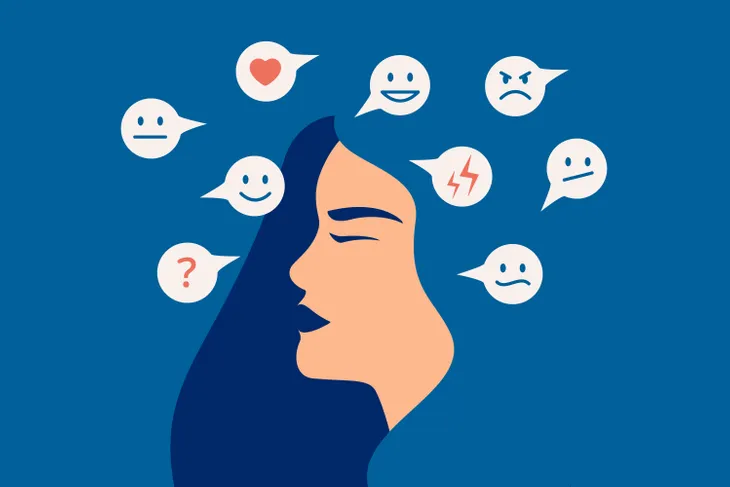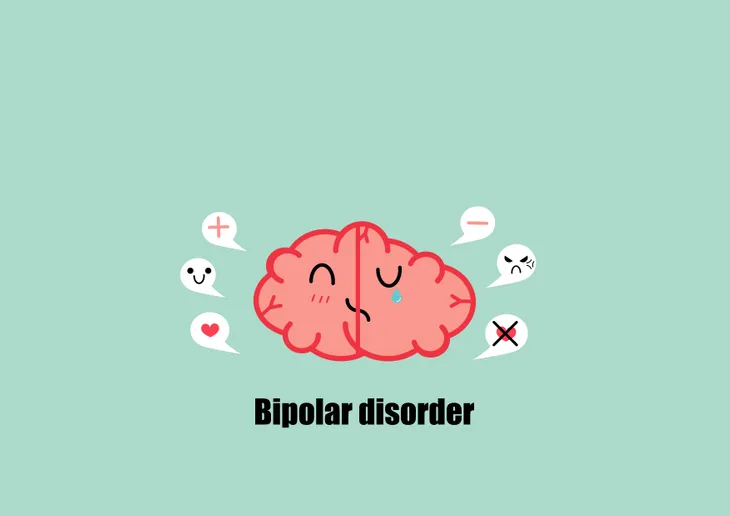- Mania, or manic episodes, is a condition where one may experience abnormally elevated or extreme changes in mood, emotion, energy, or activity level.
- The cause of manic episodes can vary from person to person, but some common causes include family history, a chemical imbalance in the brain, or a significant life change.
- The two main treatment options for manic episodes include talk therapy or medication, alongside lifestyle changes to cope effectively with the condition.
Manic episodes are part of a condition where you display an over-the-top level of activity, energy, mood, or behavior, according to the Cleveland Clinic. Manic episodes must be an elevation or change from your normal behavior and be noticeable to others. Some common symptoms of mania include feelings of invincibility, racing thoughts, rapid talking, and false beliefs or perceptions. Follow along as we break down everything to know about manic episodes, including the signs, causes, treatment, and how to cope with the disorder.
What Is A Manic Episode?
Mania is a condition where you have an episode of abnormally elevated or extreme changes in your mood, emotion, energy, or activity level, according to Cleveland Clinic. The American Psychological Association defines a manic episode as “generally, a state of excitement, overactivity, and psychomotor agitation, often accompanied by over-optimism, grandiosity, or impaired judgment.”
Abnormal behavior in a manic episode can be anything from an extreme level of happiness to intense irritation. A manic episode is typically followed by periods of depression, fatigue, sadness, or hopelessness. Manic episodes are most common in those with bipolar disorder, but there are other causes of manic episodes.
 Shutterstock/Contimis Works
Shutterstock/Contimis WorksBehavioral Signs of Mania
It’s important to recognize the signs and symptoms of a manic episode. Most manic episodes are behavioral and can be easily observed by a loved one. According to VeryWellMind, some common behavioral symptoms include a decreased need for sleep, rapid speaking or talking loudly, flight of ideas, grandiosity, and increased irritability.
Other symptoms may include feeling euphoric, being easily distracted, being obsessed with an idea or activity, or having an abnormally high level of happiness or excitement. Those experiencing a manic episode may also engage in impulsive behaviors such as buying sprees or reckless business investments.
Psychotic Symptoms of Mania
Occasionally the symptoms of mania can shift from behavioral symptoms to psychotic symptoms, according to Cleveland Clinic. These psychotic symptoms are typically the most extreme form of mania and should require attention from a doctor or psychotherapist immediately.
One type of psychotic symptom could be delusions, which are false beliefs or ideas that are not reflective of reality. An example of this could be the person being paranoid that everyone is following them. Another type of psychotic symptom is having hallucinations, meaning the person is seeing, hearing, tasting, smelling, or feeling things that are not really there. This could include a voice talking to them when there is no one there.
 Shutterstock/shisu_ka
Shutterstock/shisu_kaManic Episodes and Bipolar Disorder
Bipolar I disorder is a mental health disorder where a person experiences major high and low swings in their mood and energy. It is typically categorized by periods of mania followed by periods of depression.
To be diagnosed with bipolar 1 disorder, you have to experience at least one manic episode that lasts seven days or experience an episode so severe it requires hospitalization, according to Cleveland Clinic. It’s important to note that most people have both episodes of mania and depression, but it’s not necessary to go through depressive episodes to be diagnosed with mania.
Causes of Manic Episodes
There isn’t an exact cause of manic episodes, but there are several factors that may contribute to them. It’s important to note that the cause of manic episodes typically differs from person to person.
Cleveland Clinic explains that some common causes of manic episodes include family history, a chemical imbalance in the brain, a side effect of medication, alcohol, or drugs, a significant life change, difficult life situations, high-stress levels, a lack of sleep or a side effect of another mental health disorder.
Triggers of Manic Episodes
Each person who has been diagnosed with mania may have a different experience of what triggers them. Many treatment programs recommend keeping a mood diary to track how you feel and recognize patterns of when episodes occur. You could also ask your loved ones to monitor your behavior and see if they can recognize any triggers as an outsider. Knowing the triggers can help you come up with a plan to prevent episodes from happening in the future.
While each person’s experience is different, there are a few common triggers of manic episodes to be aware of. According to Cleveland Clinic, some common triggers include highly stimulating environments such as being in a situation that has excessive noise, bright lights, or large crowds. Major life changes can also trigger mania such as a divorce or job loss. Lack of sleep and substance abuse may also trigger manic episodes.
Diagnosis of Manic Episodes
It’s important to contact a healthcare provider if you are noticing signs and symptoms of manic episodes. Cleveland Clinic explains that the doctor will ask about your medical history, family history, current prescriptions, and supplements you take. They may also request a blood test or body scan to rule out other conditions that are similar to mania.
To be diagnosed with mania, your doctor may follow the criteria of the American Psychiatric Association’s Diagnostic and Statistical Manual of Mental Disorders, DSM-5. This criterion includes:
- Abnormal, long-lasting elevated expression of emotion that lasts at least one week
- Three or more symptoms that are a noticeable change from typical behavior
- A mood disturbance extreme enough to disrupt daily functioning
Treatment of Manic Episodes: Therapy
Mania can be treated with the help of talk therapy, medication, and the support of loved ones. It’s important to have support when it comes to a mania diagnosis, so it may also be helpful to seek out a support group to share experiences and coping strategies. Cleveland Clinic explains that when it comes to therapy, there are two main types of treatment to consider: psychotherapy and cognitive behavioral therapy.
Psychotherapy involves a variety of techniques which involves talking with a mental health professional to discuss factors that might be triggering you and finding strategies to cope and prevent them from happening. Cognitive behavioral therapy is another type of therapy that can help you change the inaccurate perceptions that you may have about yourself and the world around you.
 Shutterstock/Peera_stockfoto
Shutterstock/Peera_stockfotoTreatment of Manic Episodes: Medication
Another helpful tool to treat manic episodes is to consider a medication prescribed by your mental health professional. Manic episodes are typically treated with antipsychotic medication, while long-term treatment may involve mood stabilizers to prevent future episodes, according to Very Well Health.
Some common antipsychotics that may be prescribed include Abilify, Latuda, Risperdal, Seroquel, Vraylar, and Zyprexa. Some mood stabilizers that may be prescribed include Depakote, Lithium, and Tegretol.
Coping with Manic Episodes
Aside from therapy and medication, there are other lifestyle changes available that may help to cope with manic episodes. According to Very Well Health, it’s important to prioritize exercise and a well-rounded diet to ensure you’re feeling the best version of yourself.
It can also be helpful to maintain a consistent sleep schedule and journal daily to track your moods and feelings. Lastly, it’s critical to stay on track with your doctor appointments and medication schedule to maintain treatment.
Helping Family & Friends Understand Mania
There’s no denying that it can be difficult to understand mental health as an outsider, but it’s important to have an honest conversation with family and friends, especially if you’ve been diagnosed with the condition. Be sure to let your family and friends know what you find helpful and what you don’t find helpful when managing the condition to ensure they can support you in the best way possible.
You could also ask your loved ones to try to help you identify triggers if it’s difficult for you to recognize them yourself. Also, be open about the condition with your loved ones and try to describe how your symptoms feel to give them a better understanding. Lastly, ask for help when you need it and provide guidance on the best way they can help you.
Supporting Loved Ones with Mania
If you have a loved one who experiences manic episodes or bipolar disorder, there are many strategies to keep in mind. While it may not seem like a first thought, it’s important to practice self-care and prioritize your own health and well-being. This will give you the mental strength to ensure you’re in the best place to provide support to help your loved one better handle their manic episodes.
It’s also important to be vigilant in observing the behavior of your loved one and recognizing the early signs that a manic episode may be on the horizon. This can help you seek treatment options before the situation progesses, and allow time to get them in contact with a mental health professional. You could even consider journalling symptoms on behalf of your loved one to help them and their doctor better understand their condition.
 Shutterstock/fizkes
Shutterstock/fizkes










